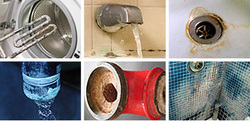
Water quality and improving hard water is an issue for many people in Australia. Hard water is any water made up of an an appreciable amount of dissolved calcium (it has high total hardness) when you apply a hard water test.
Magnesium and calcium may be added to the natural water system as it passes through earth and rock made up of large amounts of these calcium deposits, such as sandstone, limestone, and siltstone. Calcium is a common and naturally occurring reality of the underground water sources.
Hard water does not pose a health threat and is not regulated by state or government agencies. Water hardness can often be confused with alkalinity because both of them are reported in the exact same units (mg/l CaCO3).
Hard Water – Five Key Problems Problems connected with hard water range from nuisances such as “hard water hair” to costly commercial breakdowns. It is well known that hard water causes scaling; where the precipitation of minerals forms a hard deposit called lime.
Magnetic water treatment systems are unlikely to work as this quote from wikipedia shows.
Scientific and engineering studies generally refute the effectiveness of the method, finding no differences not attributable to other causes between systems with and without a magnetic water treatment device, and no theoretical basis to expect that there might be.
Read more about our view on magnetic water treatment here
Improving Hard Water With Digital Water Conditioning Did you know that it is possible to solve your water hardness problem, easily where the water enters your home via the main water pipe? Digital water conditioning is an eco-friendly defence to stop lime scale and rust. This technology helps to keep plumbing and electrical home equipment looking new. It safeguards your brand-new water pipes and water heating systems and even better… existing ones are cleaned.
Water pipes remain clear.
Magnesium and calcium may be added to the natural water system as it passes through earth and rock made up of large amounts of these calcium deposits, such as sandstone, limestone, and siltstone. Calcium is a common and naturally occurring reality of the underground water sources.
Hard water does not pose a health threat and is not regulated by state or government agencies. Water hardness can often be confused with alkalinity because both of them are reported in the exact same units (mg/l CaCO3).
Hard Water – Five Key Problems Problems connected with hard water range from nuisances such as “hard water hair” to costly commercial breakdowns. It is well known that hard water causes scaling; where the precipitation of minerals forms a hard deposit called lime.
- The main problems linked to hard water are the mineral deposits which they leave behind. Particularly when your equipment or appliance handles a lot of water, the limescale can build up fast. Apart from being unsightly anywhere it accumulates, this particular scale can block pipes or cut short the life of flushing toilets and water heating systems.
- The plumbing and water heating systems often clog up so badly, they have to be replaced. Expensive system repairs from a plumber will likely then become inevitable.
- One other issue is related to how hard water responds to soap and the soap residue that it leaves. That is why, clothes that are laundered in hard water don’t get because clean and feel rigid and scratchy immediately after laundering.
- What’s more, where the water is especially challenging, or the people using it are especially prone to this, hard water can cause things including skin rashes, psoriasis and eczema.
- The scale deposited by hard water is also know to increase energy expenses by as much as 25%.
- Reverse Osmosis
- Chemical Water Softeners
- Magnetic hard water treatment
- Hard water stain removal
Magnetic water treatment systems are unlikely to work as this quote from wikipedia shows.
Scientific and engineering studies generally refute the effectiveness of the method, finding no differences not attributable to other causes between systems with and without a magnetic water treatment device, and no theoretical basis to expect that there might be.
Read more about our view on magnetic water treatment here
Improving Hard Water With Digital Water Conditioning Did you know that it is possible to solve your water hardness problem, easily where the water enters your home via the main water pipe? Digital water conditioning is an eco-friendly defence to stop lime scale and rust. This technology helps to keep plumbing and electrical home equipment looking new. It safeguards your brand-new water pipes and water heating systems and even better… existing ones are cleaned.
Water pipes remain clear.
- Significantly less repairs and upkeep in your home, equipment or plant.
- Will save power expenses.
- Reduces cleaning efforts.
- Does away with the need for chemical cleaners.
- Equipment lasts longer: it remain clean and clear from scale.
- Fixtures remain sparkling for a longer time.
 RSS Feed
RSS Feed